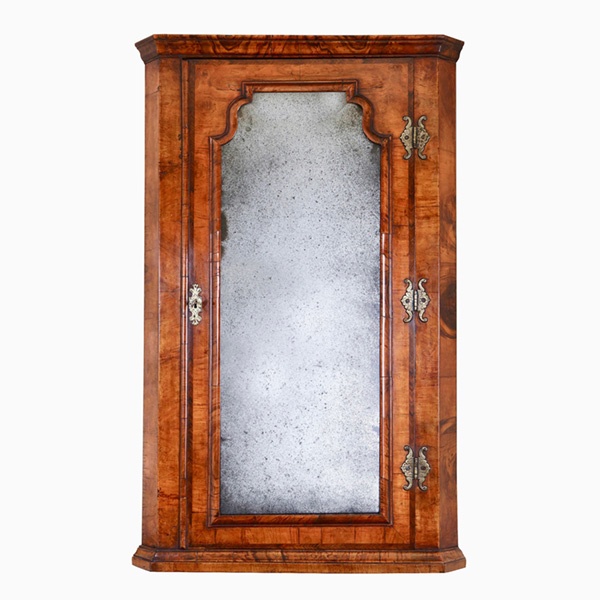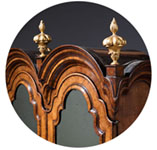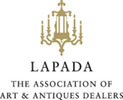17th Century William and Mary Kingwood Coffre Fort Box Concealing Three Secrets
Sold
Request Information
Follow Us
17th Century William and Mary Kingwood Coffre Fort Box Concealing Three Secrets
A superb William and Mary Kingwood / Princes Oyster strongbox or coffre fort of small proportions, circa 1680-1700, England.
Adorned with highly decorative thick gilt brass strapwork and decorated entirely in knife cut oysters of kingwood, this box is fit for the most discerning of collectors.
The large gilt brass shield-shaped clasp opens on a push-spring release to reveal a box interior lined in rosewood, above two short rosewood-lined drawers.
Once the lid is opened you can reach inside to slide the original brass bolt lock to open the fall. Once the fall is open you will find two short drawers lined in rosewood. To access the secret boxes you must first remove the drawers. You can then slide out a small mitred piece situated above each drawer and a box will drop down from each side. The central drawer division can also be removed revealing a secret compartment accessed from the back by sliding a small dovetail-housed piece of oak.
The box appears decorative, but it was also very difficult to break open or steal. It has a strong lock to the centre and two bolts concealed in the sides, so that it could be screwed down into floorboards if necessary or that of a horse-drawn carriage. Strong boxes veneered in oysters of Princewood such as this were luxury objects.
The cabinet-makers who would have constructed and veneered the carcase apparently sold them, often using tropical hardwood veneers, and mounted it with sets of mounts, handles and locks bought in from brass founders. The elaborate veneering and conspicuous gilded brass mounts show that the appearance of these objects was important.
Thomas Pistor, of Ludgate Hill, London worked with the renowned cabinetmaker Gerrit Jensen. Gerrit Jensen supplied a walnut-veneered ‘strongbox’ to Colonel James Grahame in 1668, Levens Hall. It is recorded that Thomas Pistor’s remaining stock was sold off post his death in 1711, included ‘three fine Princes wood strongboxes’.
The present example relates to a strongbox held in the Victoria & Albert Museum. Accession Number: W.10-1951.
It should be noted that this is an accomplished and fine example having thick-cut gilt brass and superb cuts of Kingwood to the top, face and sides. The back is veneered in rosewood.
Condition
Good. Wear consistent with age and use. Superb original condition. Fabulous colour and patination.
Dimensions
Height: 21 cm (8.27 in)
Width: 36.5 cm (14.38 in)
Depth: 23.5 cm (9.26 in)
PREVIOUSLY SOLD
No Results Found
The page you requested could not be found. Try refining your search, or use the navigation above to locate the post.
No Results Found
The page you requested could not be found. Try refining your search, or use the navigation above to locate the post.
YOU MAY ALSO LIKE

Queen Anne Walnut Corner Cupboard with Bevelled Mirror Plate
A truly remarkable find in original condition. To the door a shaped soft bevelled mirror plate is framed by a cross-grain molding of typical queen Anne design which is further cross-banded, feather-banded and edged to the opening with a single de-molding.

Queen Anne Walnut Corner Cupboard with Bevelled Mirror Plate
A truly remarkable find in original condition. To the door a shaped soft bevelled mirror plate is framed by a cross-grain molding of typical queen Anne design which is further cross-banded, feather-banded and edged to the opening with a single de-molding.













